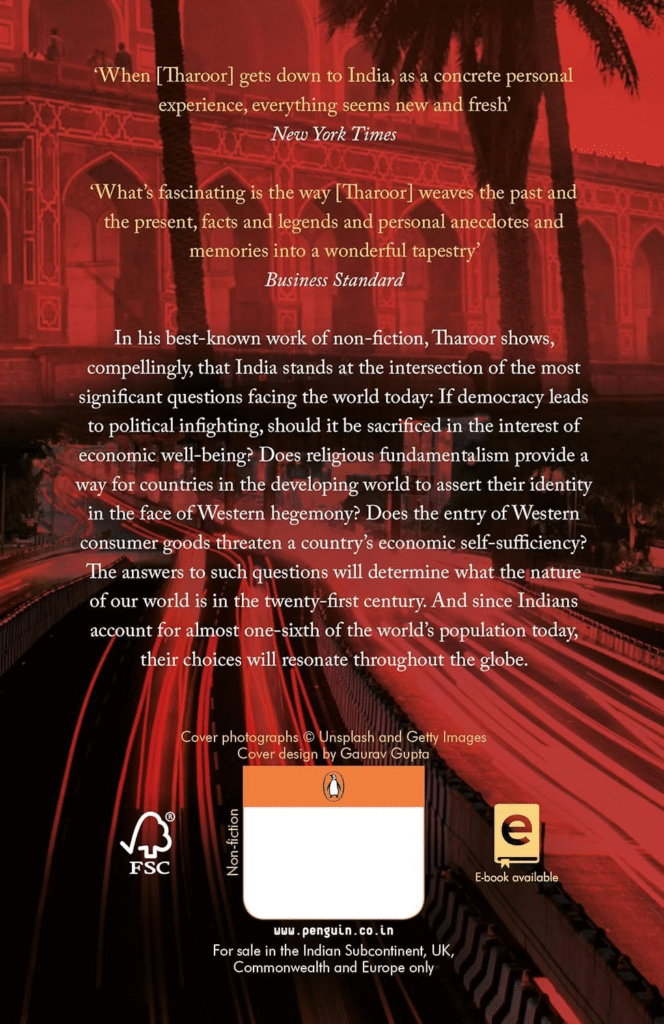India: From Midnight to the Millennium and Beyond by Shashi Tharoor is a best work of non-fiction offers a comprehensive analysis of India’s journey since its independence in 1947. Tharoor examines the country’s political, social, and economic evolution, addressing critical issues such as democracy, secularism, caste, globalization, and India’s role on the world stage. The book is a thoughtful blend of history, personal reflection, and analysis, providing insights into India’s triumphs and challenges over the decades. It is an essential read for anyone seeking to understand modern India and its future trajectory.

Tharoor’s eloquent writing and his ability to provide a grand narrative on India, covering various aspects such as politics, economy, culture, language, religion, diaspora, and caste.
This book is a well-researched and engaging book that delves into the complexities of India’s post-independence history, making it a valuable resource for readers interested in understanding the nation’s past, present, and future.
“Shashi Tharoor deals with this vast theme in a work of remarkable depth and startling originality, combining elements of political scholarship, personal reflection, memoir, fiction, and polemic, all illuminated in vivid and compelling prose.”
This description highlights Shashi Tharoor’s mastery in addressing a broad and complex subject with exceptional depth and creativity. By blending political analysis, personal insights, storytelling, and critical arguments, the book offers a multifaceted perspective. The prose is engaging and vivid, making complex ideas accessible and thought-provoking for readers. It emphasizes the book’s originality and its ability to balance intellectual rigor with narrative charm.
Availability and Detail
India: From Midnight to the Millennium and Beyond by Shashi Tharoor is a compelling analysis of India’s journey since gaining independence in 1947. The book explores India’s political, social, and economic evolution. It examines important themes like democracy, secularism, caste, and globalization. It also discusses India’s role on the global stage. Tharoor blends history, personal insights, and analysis. He offers a nuanced view of India’s achievements and challenges. This makes it a must-read for understanding modern India and its future.
This book is available in multiple formats. The paperback edition, priced at ₹270, contains 389 pages and is published by Penguin Books. The hardcover version is significantly more expensive, priced at ₹2,998. For those who prefer audio formats, the audiobook is available for ₹879, while the Kindle edition is the most affordable digital option at ₹250. These formats are widely accessible both in physical bookstores and online platforms like Amazon, Flipkart and Goodreads.
About Author of India

Shashi Tharoor is a renowned author, critic, and columnist, celebrated for his over twenty books across fiction, non-fiction, and essays, is also a prolific writer of articles and columns on politics, history, and culture. His notable works include The Great Indian Novel, India: From Midnight to the Millennium, An Era of Darkness: The British Empire in India (winner of the Ramnath Goenka Award for Excellence in Journalism in 2016), and The Paradoxical Prime Minister: Narendra Modi and His India.
Tharoor has served as the Under Secretary-General of the United Nations, a Minister of State in the Indian Government, and is a three-time Member of Parliament from Thiruvananthapuram. He currently chairs the Parliamentary Committee on Information Technology.
Recognized for his contributions, he has received several prestigious honors, including the Sahitya Akademi Award, the Commonwealth Writers’ Prize, the Crossword Lifetime Achievement Award, and the Pravasi Bharatiya Samman, India’s highest honor for overseas Indians. In 2010, he was also named NDTV’s New Age Politician of the Year.
Themes Explored in India: From Midnight to the Millennium and Beyond

India: From Midnight to the Millennium and Beyond by Shashi Tharoor offers a comprehensive analysis of India’s journey since independence, delving into its political, economic, and cultural evolution. The book addresses several pivotal themes that have shaped modern India. They are:
1. Political Evolution and Democracy: Tharoor examines in this book India’s transition from colonial rule to a democratic republic, highlighting the challenges and triumphs of sustaining the world’s largest democracy. He discusses the complexities of federalism, the balance between central and state powers, and the resilience of democratic institutions in the face of internal and external pressures.
2. Economic Transition: Socialism to Liberalization: The book explores India’s economic policies post-independence, focusing on the initial adoption of socialist principles inspired by the Soviet model. Tharoor critiques the inefficiencies and bureaucratic red tape of the License Raj era, which stifled private entrepreneurship and innovation. He then traces the shift towards economic liberalization in the 1990s, analyzing its impact on India’s growth and integration into the global economy.
3. Cultural and Religious Pluralism: Tharoor delves into India’s rich cultural diversity and the challenges of maintaining secularism in a multi-religious society. He reflects on the rise of religious fundamentalism and its implications for national unity, emphasizing the importance of pluralism and tolerance in sustaining India’s democratic fabric.
4. Caste System and Social Justice: The persistent issue of caste-based discrimination is scrutinized, with Tharoor discussing the socio-economic disparities and efforts towards affirmative action. He provides insights in the book into the complexities of caste dynamics and the ongoing struggle for equality and social justice in contemporary India.
5. Globalization and India’s Role on the World Stage: The impact of globalization on India’s economy and society is analyzed, considering both opportunities and challenges. Tharoor discusses India’s emergence in this book as a significant global player, its foreign policy strategies, and the balancing act between embracing global markets and preserving national interests.
6. Secularism and Indian Identity: In this book Tharoor reflects deeply on the secular fabric of the nation, tracing its roots to the principles of inclusivity championed by early leaders like Mahatma Gandhi and Jawaharlal Nehru. He argues that India’s strength lies in its ability to accommodate diverse religious, linguistic, and cultural identities. Tharoor critiques the growing influence of religious nationalism, cautioning against its divisive potential and stressing the need for a pluralistic identity to preserve the essence of Indian democracy.
7. Education as a Catalyst for Change: Tharoor underscores the transformative power of education in this book. He emphasizes the role of literacy and social awareness in bridging economic disparities and fostering innovation. The book advocates for a holistic approach to education, addressing areas like financial literacy, legal rights, and creative skill-building. Tharoor suggests that investing in education is India’s most effective strategy to empower its citizens and sustain its development.
8. Gender Equality and Women Empowerment: In this book, Tharoor touches on the challenges and progress in achieving gender equality in India. He highlights the critical role of women in the nation’s development and critiques the societal and systemic barriers that hinder their full participation. The book explores ways to uplift women through education, economic opportunities, and legal reforms, framing gender equality as an essential component of India’s journey towards modernization.
9. The Role of Leadership in Nation-Building: Tharoor provides a nuanced evaluation of India’s leadership post-independence in this book. From Nehru’s vision of a secular, socialist democracy to Indira Gandhi’s controversial Emergency, the book explores how leadership decisions have shaped India’s trajectory. Tharoor acknowledges both achievements and missteps, offering lessons for future leaders to prioritize accountability, inclusivity, and ethical governance.
10. The Paradox of Economic Growth and Social Justice: In this book Tharoor delves into the paradox of India’s economic growth coexisting with social inequalities. While economic liberalization has propelled India onto the global stage, the book critiques the uneven distribution of its benefits. Tharoor urges policymakers to strike a balance between market-driven growth and social welfare, ensuring that economic reforms address poverty and uplift marginalized communities.
11. Media, Technology, and Modern India: Tharoor explores the role of media and technology in shaping modern India in this book. He examines how advancements in telecommunications, digital platforms, and satellite television have revolutionized communication and democratized information. However, Tharoor also raises concerns about misinformation, media bias, and the digital divide, urging India to leverage technology responsibly for inclusive growth.
12. Environmental Challenges and Sustainability: In this book, Tharoor addresses India’s environmental challenges, from urban pollution to deforestation and water scarcity. He emphasizes the need for sustainable development practices that balance economic growth with ecological preservation. Tharoor calls for greater awareness and policy measures to combat climate change, arguing that environmental sustainability is integral to India’s long-term prosperity.
13. India’s Global Aspirations and Soft Power: Tharoor discusses India’s rise as a global player and its use of soft power in this book. He highlights India’s cultural influence, from Bollywood to yoga, and its diplomatic efforts in fostering international relations.
Tharoor’s narrative is enriched with personal anecdotes, historical analysis, and reflections on India’s past, present, and potential future. His eloquent prose and in-depth examination make this book a vital read for those seeking to understand the multifaceted nature of India’s evolution over the decades.
Reviews from Newspaper
- A work of remarkable depth
– The Hindu
- “When [Tharoor] gets down to India, as a concrete personal experience, everything seems new and fresh”
— New York Times - “What’s fascinating is the way [Tharoor] weaves the past and the present, facts and legends and personal anecdotes and memories into a wonderful tapestry”
— Business Standard
Why to Buy the Book
This book is a compelling journey through the evolving political and economic era of post-independence India. Written by Shashi Tharoor, the book offers a nuanced narrative of the nation’s transformation, with key insights into critical moments such as the Nehruvian era, the Emergency under Indira Gandhi, Rajiv Gandhi’s leadership, and the sweeping changes brought by economic liberalization.
Tharoor’s masterful storytelling makes complex political events accessible, while personal anecdotes add depth and warmth to the narrative, such as his reflections on Charlis. This book is an invaluable resource for anyone wanting to better understand India’s dynamic history, its democratic resilience, and its economic evolution. Whether you are a history enthusiast or simply intrigued by India’s growth, this book provides both insight and inspiration, making it an essential read and is a must-have addition to your bookshelf.

Writing and Language Style of the Book
Shashi Tharoor’s showcases his exceptional command of language and remarkable ability to articulate complex ideas with depth and clarity. His sophisticated prose and eloquent narration make the book an engaging read for those who enjoy thoughtful and detailed analyses. However, some readers might find his verbosity a bit overwhelming, as his writing style tends to lean heavily on intricate descriptions and intellectual phrasing.
The book strikes a balance between liberal and patriotic viewpoints, offering a nuanced critique of India’s successes and failures. Tharoor’s candid commentary on pivotal topics, such as the Emergency era, and his insightful reflections on India’s potential as a political and economic power, stand out as significant highlights.
For Indians living or working abroad, this book is particularly relevant. Tharoor’s writing provides a comprehensive perspective on India’s political and social evolution, making it an excellent resource for those interacting with international or culturally diverse teams. While the book may not delve as deeply into history as some readers might expect, it serves as a concise yet meaningful summary of Indian politics and society over the decades.
With its intricate writing style and thoughtful observations, book successfully weaves history, personal anecdotes, and sharp analysis into a compelling narrative that captures the essence of modern India.
Final Thoughts
This book by Shashi Tharoor is a profound exploration of India’s journey since independence, offering a nuanced perspective on its triumphs and struggles. Tharoor’s insightful analysis of democracy, secularism, globalization, and caste provides readers with a deeper understanding of India’s complex identity and its pivotal role on the global stage. Through a blend of history, personal reflection, and sharp commentary, the book challenges readers to reflect on the choices shaping India’s present and future. It is a compelling read for anyone seeking to grasp the intricate dynamics of modern India and its evolving place in the 21st century.




